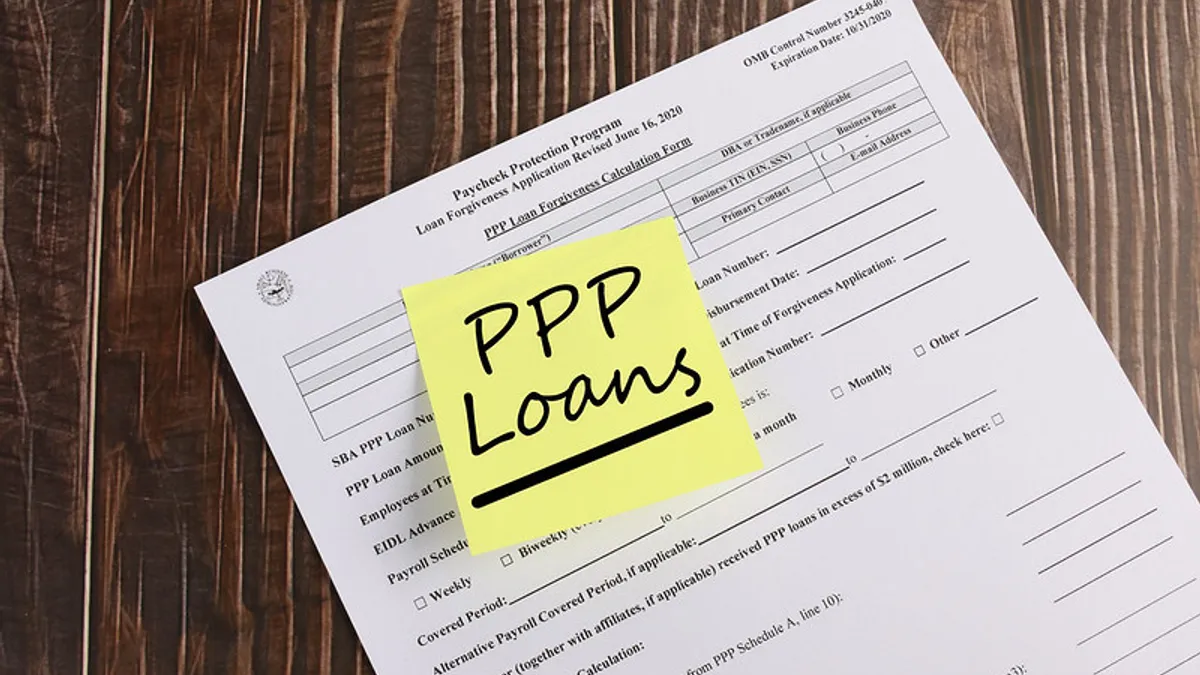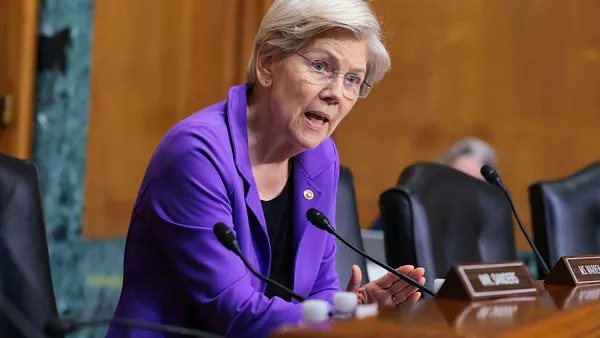Dive Brief:
- The Small Business Administration (SBA) announced Thursday it has suspended fintechs Blueacorn and Womply from working with the agency “in any capacity.”
- The SBA also launched an investigation into Cross River Bank, Celtic Bank, Customers Bank, and nonbank lenders Fountainhead, Harvest, Capital Plus, Benworth and Prestamos, but did not suspend them from agency participation, it said Thursday.
- The moves come a week after the House Select Subcommittee on the Coronavirus Crisis released a scathing report detailing lax anti-fraud standards held throughout the SBA’s Paycheck Protection Program (PPP) and identifying Blueacorn and Womply as the worst offenders.
Dive Insight:
Thursday’s restrictions and investigations surface roughly two months after the SBA signaled it would expand the stable of nonbank lenders participating in its flagship 7(a) loan program to include fintechs for the first time.
Last week’s report, however, struck a blow to some fintechs’ reputations, concluding the firms’ lack of fraud controls made them the “paths of least resistance” for PPP borrowers seeking to exploit the government-backed COVID-19 relief.
“Even as these companies failed in their administration of the program, they nonetheless accrued massive profits from program administration fees, much of which was pocketed by the companies’ owners and executives,” Rep. James Clyburn, D-SC, the subcommittee’s chairman, said in a statement last week.
Banned
Womply and Blueacorn, the subcommittee found, “failed to implement systems capable of consistently detecting and preventing fraudulent and otherwise ineligible PPP applications.” Womply collected $2 billion in PPP fees; Blueacorn, $1 billion.
Blueacorn chased higher fees by giving priority and less scrutiny to high-dollar loans, designating them as “VIPPP,” the report concluded, noting that the company’s “ownership directed reviewers to prioritize ‘monster loans [that] will get everyone paid,’” while urging employees to dismiss applications for smaller loans.
Blueacorn and Womply’s lending partners, Capital Plus and Harvest, “did little to oversee the activities of the companies to which they delegated their responsibilities,” the subcommittee found.
Investigated
In addition to probing the lenders named in the report, the SBA said Thursday it would investigate individuals and entities connected to them.
Phil Goldfeder, Cross River’s senior vice president of global public affairs, told American Banker on Thursday he was surprised to find the SBA would investigate the bank, saying last week’s report "actually lauded the work of responsible banks like Cross River."
"Cross River answered the call of Congress to help the smallest businesses survive the pandemic, and now we count on the SBA to do the right thing and differentiate between those who truly helped during the pandemic and those who didn't do enough to deter and identify fraud," Goldfeder told the outlet.
Indeed, one of Womply’s lending partners criticized the fintech’s fraud prevention practices, describing the systems as “put together with duct tape and gum,” according to the report.
Womply refused to cooperate with the SBA inspector general’s office and lending partner Fountainhead, which requested information to investigate potential fraudulent PPP borrower activity, the subcommittee found.
Fountainhead was forced to get “a temporary restraining order against [Womply], so they can’t destroy these [PPP loan] documents,” according to the report.
Fountainhead CEO Chris Hurn told American Banker he would cooperate fully with the new investigation, adding that his company has "always strived to conduct itself honorably and carry out [PPP’s] objectives.”
Celtic, another bank now under SBA investigation, urged its fintech partner, Bluevine, to invest in fraud controls and comply with SBA standards, the subcommittee found. Bluevine, however, still failed to timely report fraud to law enforcement, and those delays caused Celtic Bank to submit late suspicious activity reports (SARs), which likely impeded law enforcement efforts to address ongoing fraud, the report found.
“[T]he industry should push hard to make sure the SBA accepts the fraud risk,” Celtic Bank CEO Reese Howell wrote in an internal email obtained by the subcommittee.
David Patti, communications director at Customers Bank, which is also under investigation, told American Banker the SBA should “find that our policies, procedures and actions satisfied our obligations under the PPP program and other applicable laws.”
Customers Bank used Kabbage as its servicing partner before ending the relationship in August 2020 — the same month American Express struck a deal to acquire the fintech.
Effect on 7(a) expansion?
In its statement Thursday, the SBA said it would “continue to prioritize its response to findings of potential fraud in pandemic relief programs,” adding that it would work with the House subcommittee to examine evidence laid out in last week’s report and take action to address fraud and weaknesses in control. The SBA also pledged to ensure financial regulators “have a coordinated response to wrongdoing by lenders.”
The subcommittee, perhaps with an eye on proposed changes to the SBA’s 7(a) program, warned the agency to “consider carefully whether unregulated businesses such as fintechs, many of which are not subject to the same regulations as financial institutions, should be permitted to play a leading role in future federal lending programs.”
A half-dozen bank and credit union trade groups, in a letter last Friday, called the report “the most stunning example showcasing the need to press pause on bringing FinTech into the 7(a) program.”
Trade groups aren’t the proposed 7(a) expansion's only opponents. Hurn, of Fountainhead, called it a “bad idea that could negatively impact the integrity of SBA’s loan programs.”
Fountainhead purchased one of the agency’s 14 Small Business Lending Company (SBLC) licenses from American Business Lending in February 2019.
“The SBA has a difficult enough time right now overseeing the current SBLCs — slow response times, drawn-out approval processes, clarity and guidance issues — so adding more SBLCs without more resources is a recipe for disaster,” Hurn told Banking Dive.











